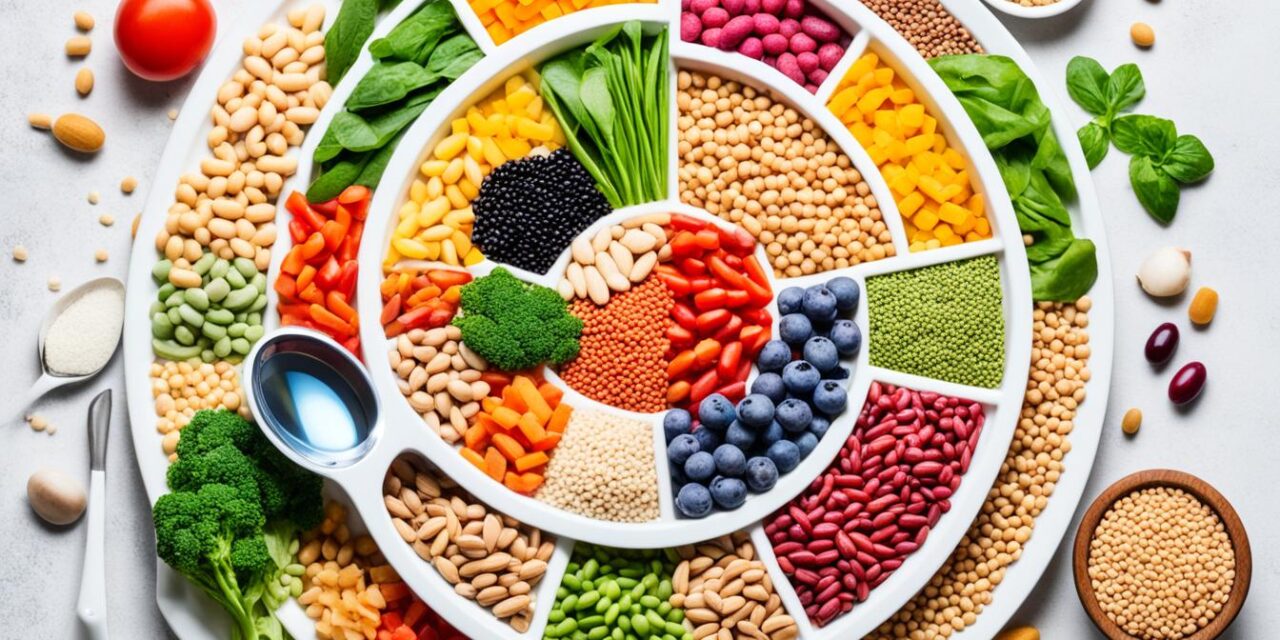Did you know that lectins, a family of proteins found in plants, animals, and microbes, can have surprising impacts on your health? Lectins play a critical role in the immune system, defense against pathogens, and even potential cancer-fighting properties. However, some types of lectins can cause negative reactions in your digestive system, leading to concerns about their consumption.
Key Takeaways:
- Lectins are proteins found in many foods, with varying levels of potential harm.
- Some lectins are resistant to animal digestive enzymes, leading to poor digestive reactions.
- Certain lectins, like ricin and gluten, can be toxic and harmful to the body.
- Proper food preparation methods, such as soaking, boiling, roasting, or pressure cooking, can reduce lectin levels in certain foods.
- Individuals with a leaky gut or sensitivity to specific lectins should be cautious with their consumption.
The Role of Lectins in the Body
Lectins, those fascinating little proteins, play a crucial role in the functioning of our bodies. They contribute to the proper functioning of our immune system, acting as our natural defense against harmful pathogens. But that’s not all! These versatile proteins have also been studied for their potential in fighting off cancer cells, making them a force to be reckoned with.
When it comes to their importance, it’s safe to say that lectins are not just a minor player. They are present in nearly every organism on Earth, highlighting their widespread significance. However, despite their ubiquity, there is still much we don’t know about their exact roles in different organisms. But isn’t that the beauty of scientific discovery?
So, the next time you come across the term “lectins,” remember that they are not just some insignificant protein. They are powerful protectors of our immune system and potentially hold the key to fighting off cancer cells. Let’s dig deeper into the world of lectins and uncover their secrets!
| Lectins’ Role in the Body | Benefits |
|---|---|
| Assist in the immune system | Protect against harmful pathogens |
| Potential cancer-fighting properties | Combat cancer cells |
The Potential Dangers of Consuming Lectins
While lectins are present in a variety of plants and can be a natural part of our diet, there is growing concern about the potential dangers associated with their consumption. Certain types of lectins have been theorized to have negative effects on the human digestive system, raising questions about their safety.
One significant issue is that some lectins are resistant to animal digestive enzymes. This means that when you consume these lectins, your body may have difficulty breaking them down properly. This resistance can lead to poor digestive reactions, causing discomfort and disrupting the normal functioning of your digestive system.
Furthermore, specific lectins, such as ricin and gluten, have been identified as toxic and harmful to the body. Ricin is a lectin found in castor beans, and it is so potent that it can be used as a deadly poison. On the other hand, gluten, a lectin present in wheat and other grains, has gained attention for its association with digestive upset and long-term health conditions.
The potential dangers of consuming lectins highlight the importance of understanding their presence in our diet and the potential impact on our health. While some lectins can be problematic, it’s essential to note that not all lectins are harmful. Some lectins may even offer health benefits, such as cancer-fighting properties found in certain plant lectins.
Managing Lectin Consumption
While lectins are unavoidable in our diets, there are clever ways to reduce their presence and enjoy your favorite foods without worries. By applying specific food preparation methods, you can effectively reduce the lectin content in certain foods and minimize the chance of negative reactions.
Let’s take a look at some effective techniques you can use:
- Soaking: Soaking grains, legumes, and nightshade vegetables in water can help reduce their lectin levels. Aim to soak them for at least several hours or overnight before cooking.
- Boiling: Boiling foods can also help break down lectins. Ensure you bring the water to a full boil and let the food cook for an adequate amount of time to ensure lectin reduction.
- Roasting: A delicious way to reduce lectins is by roasting your favorite lectin-rich foods. This method not only adds a rich flavor but also aids in breaking down lectins.
- Pressure cooking: When time is precious, pressure cooking can be a game-changer. The high pressure and steam created in a pressure cooker can effectively reduce lectin levels.
Tip: Remember, managing lectin consumption is all about finding the right balance. Enjoy a variety of foods and experiment with different preparation methods to make sure you’re minimizing lectin levels while still enjoying a tasty and balanced diet.
By implementing these clever food preparation techniques, you can confidently indulge in a wide range of lectin-rich foods, ensuring a more pleasant and worry-free dining experience.
With these handy tips, you can conquer the lectin challenge and savor your favorite meals with peace of mind.
Conclusion
Understanding the potential dangers of lectins and managing their consumption is key to maintaining a healthy diet. While lectins are a complex topic, ongoing studies are shedding light on their impact on human health. By following proper food preparation methods, you can effectively manage lectin consumption.
If you have a leaky gut or sensitivity to specific lectins, it’s important to be cautious about the foods you consume. Identifying and avoiding lectin-containing foods that trigger negative reactions is crucial. Furthermore, implementing soaking, boiling, roasting, or pressure cooking techniques can significantly reduce lectin levels in grains, legumes, and nightshade vegetables.
Ultimately, making informed choices about managing lectin consumption is vital for your well-being. Stay educated about the potential dangers associated with lectin consumption and take necessary precautions. By doing so, you can enjoy a varied and nutritious diet without compromising your health.
FAQ
Are lectins harmful?
What is the role of lectins in the body?
What are the potential dangers of consuming lectins?
How can lectin consumption be managed?
What is the conclusion regarding lectin consumption?
MORE SOURCES TO READ:
- https://jjvirgin.com/all-about-lectins/
- https://drjengunter.com/2017/07/14/goops-misogynistic-mansplaining-hit-job/
- https://nutritiouslife.com/eat-empowered/
![]()














Recent Comments